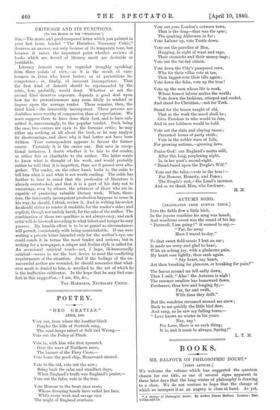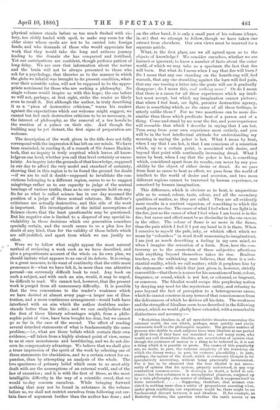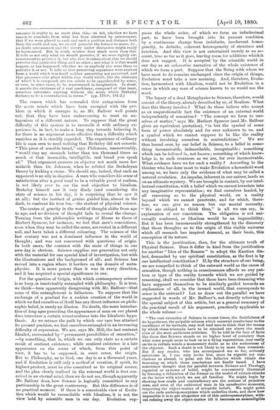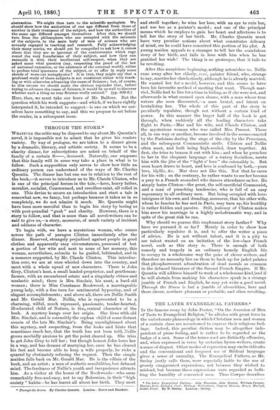BOOKS.
WE welcome the volume which has suggested the question chosen for our title, as one of several signs apparent in these later days that the long winter of philosophy is drawing to a close. We do not venture to hope that the change of which we interpret it as an augury is close at hand. As yet, • A Wawa' of Philosophic Doubt. By Arthur James Balfour. London : Mac. millan and Co. physical science stands before us too much flushed with vic- tory, too richly loaded with spoil, to make any room for the elder sister whose spoils are not to be carried into foreign lands, and who demands of those who would appreciate her work that they would take the long and arduous journey leading to the domain she has conquered and fertilised. Yet our anticipations are confident, though perforce patient of long delay. We are sure that information about the nerves and the brain will not be always presented to those who ask for a psychology, that theories as to the manner in which the globe we inhabit was brought to its present condition, what- ever their scientific value, will not be supposed to be the appro- priate nutriment for those who are seeking a philosophy. No single volume would inspire us with this hope ; the one before us will not, perhaps, at first sight, strike the reader as likely even to recall it. But although the author, in truly describing it as a "piece of destructive criticism," warns his readers against the expectations which our welcome might suggest, we cannot but feel such destructive criticism to be as necessary, in the interest of philosophy, as the removal of a few hovels:to the erection of a palace on their site. And though the building may be yet distant, the first signs of preparation are welcome.
The description of the work given in the title does not fully correspond with the impression it has left on our minds. We have been reminded, in reading it, of a remark of Sir James Mackin- tosh, that no inquiry is truly sceptical which leaves all know- ledge on one level, whether you call that level certainty or uncer- tainty. An inquiry into the grounds of that knowledge, supposed in our day to afford the very model and standard of certainty, showing that in this region is to be found the ground for doubt —if we are to call it doubt—supposed to invalidate the con- victions belonging to a different region, seems to us to suggest misgivings rather as to our capacity to judge of the mutual bearings of various truths, than as to our separate hold on any. So far as what is called science has in our day assumed the position of a judge of these mutual relations, Mr. Balfour's criticisms are actually destructive, and this side of the work is important. His investigation of the initial assumptions of Science shows that the least questionable may be questioned. But his negative aim is limited to a disproof of any special in- violability in those decisions which our generation considers specially certain, and the result seems to us a plea less for doubt of any kind, than for the validity of those beliefs which are self-justified, and apart from which we can justify no other.
, Were we to follow what might appear the most natural method of reviewing a work such as we have described, and give a proportionate account of the whole on its own plan, we should imitate what appears to us one of its defects. It is owing, in a great measure, to its want of continuity that the critic must pronounce it—what we have felt it, in more than one attentive perusal—an extremely difficult book to read. Any book on such a subject, and with such an aim, would, it may be urged, be difficult to read. We cannot feel, however, that the present work is purged from all unnecessary difficulty. It is possible that the two concessions to the reader's weakness which we have desired at almost every page—a larger use of illus- tration, and a more continuous arrangement—would both have interfered with an aim which the author doubtless under- stands better than his critic ; and we can easilybelieve that
the first of these literary advantages might, from a philo-
sophic point of view, have been bought too dear, but we cannot go so far in the case of the second. The effect of reading several detached statements of what is fundamentally the same problem,—i.e., what are those beliefs which contain their own evidence,—all taken from a highly abstract point of view, seems to us at once monotonous and bewildering, and we do not dis-
cern its compensatory advantage. We believe that we shall give a truer impression of the spirit of the work by selecting one of these statements for elucidation, and to a certain extent for ex- pansion, than by attempting an analysis of the whole. The -two specimens of primary belief which seem to us most ably
dealt with are the assumptions of an external world, and of the Jaw of causation ; and it is with the first of these, as the most intelligible difficulty in the way of a scientific creed, that we would to.day concern ourselves. While bringing forward nothing that may not be found in substance in the volume before us, we shall not restrict ourselves from following out cer- tain lines of argument further than the author has done ; and on the other hand, it is only a small part of his volume (chaps. ix.-xi.) that we attempt to follow, though we have taken one extract from elsewhere. Our own views must be reserved for a separate article.
What, in the first place, are we all agreed upon as to the objects of knowledge ? We consider ourselves, whether we are learned or ignorant, to know a number of facts about the outer world, of which we may take as a specimen the fact that fire will burn. But what do I mean when I say that fire will burn ? Do I mean that any one standing on the hearth-rug will_ feel warmth, that any one stumbling against the bars will feel pain, that any one tossing a letter into the grate will see it gradually disappear ; do I mean this, and nothing more ? Or do I mean that there is a cause for all these experiences which my intel- lect must accept, but which my imagination cannot picture ; that where I feel heat, see light, perceive destructive agency, there is something which, as the cause of all these feelings, is utterly unlike them ? For no two assertions can be more dis- similar than those which predicate heat of a person and of a
thing. Come and stand by me near the fire, and your experience will resemble that which I describe in saying that I am hot.
Turn away from your own experience most entirely, and you will be in the best intellectual attitude for understanding my meaning in saying the poker is hot. What I mean by heat, when I say that I am hot, is that I am conscious of a sensation
which, up to a certain point, is associated with desire, and beyond that point with continually increasing dread. What I
mean by heat, when I say that the poker is hot, is something which, considered apart from its results, can never by any pos- sibility be the object of either desire or dread. As we pass from heat as cause to heat as effect, we pass from the world of intellect to the world of desire and aversion, and two more different regions cannot be traversed by human experience, or conceived by human imagination.
This difference, which is obvious as to heat, is unquestion- able as to sound, colour, taste, odour, and all the secondary qualities of matter, as they are called. They are all evidently mere results in a sentient organism, of something to which the
result gives no clue. The cause of what I feel when I see light is in the fire, just as the cause of what I feel when I am burnt is in the fire ; but cause and effect must be as dissimilar in the one case as in the other. The colour of flame is no more in the flame, than the pain which I feel if I put my hand in it is there. When I conceive to myself the pale, inky, or whitish effect which we mean by " colourless " (a word itself unmeaning to imagination), I am just as much describing a feeling in my own mind, as when I imagine the sensation of a burn. Now, here the con-
troversy as to the connection of these subjective affections with anything beyond themselves takes its rise. Realism teaches, as the unthinking man believes, that there is a sub- stantial reality, which we call matter; while it perplexes him by the statement—with which that just given is, however, strictly convertible—that there is a cause for his sensations of heat, colour, fragrance, or sound, which is not hot, or coloured, or fragrant, or sonorous. The Idealist would escape this perplexing notion by denying any need for the mysterious entity, and refusing tg pass beyond the fact of perception to a heterogeneous cause, which he cannot construe in any terms of that consciousness from the deliverances of which he derives all his data. The weakness and the strength of Idealism seem to us described in the following extract, which we would gladly have extended, with a remarkable distinctness and accuracy :—
"Berlieleian idealism is, of all speculative theories concerning the external world, the one which, perhaps, most quickly and easily commends itself to the philosophic inquirer. The greater number of persons who dabble in such subjects have been idealists at one period of their lives, if they have not remained so ; and many more, who would not call themselves idealists, are nevertheless of opinion that though the existence of matter is a thing to be believed in, it is not a thing which it is possible to prove. The causes of this popularity are, no doubt, in part, the extreme simplicity of the reasoning on which the theory rests; in part, its extreme plausibility ; in part, perhaps, the nature of the result, which is commonly thought to be speculatively interesting, without being practically inconvenient. For it has to be observed that the true idealist is not neces- sarily of opinion that his system, properly understood, in any way contradicts common-sense. It destroys, no doubt, a belief in sub- stance; but then substance is a metaphysical phantom, conjured up by a vain philosophy ; the matter of ordinary life it supposes itself to leave untouched Supposing, therefore, that science con- sisted in nothing more than a series of propositions asserting what, under given conditions, our experience would be, there might be no fundamental discord between it and idealism. If, for example, as Berkeley declares, the question whether the earth moves or no
amounts in reality to no more than this,—to wit, whether we have reason to conclude, from what has been observed by astronomers, that if we were placed in such and such a position and distance both from the earth and sun, we should perceive the former to move, 8:c., no doubt astronomers and the theory under discussion might easily be harmonised. But in truth, science does much more than this. It tells us not only what we should perceive, if we were rightly cir- cumstanced to perceive it, but also how it comes about that we should perceive that particular thing, and no other ; and what it is that would happen, or has happened, whether we or anybody else were there to perceive it or not. It tells us that perceiving organisms were evolved from a world which was itself neither perceiving nor perceived, and that processes take place within that world which, like the elements of which it is composed, are too subtle to be apprehended by sense, or even, in some cases, to ho represented in imagination. In short, it asserts the existence of a vast machinery, composed of that inert, senseless substance existing without the mind, which Berkeley declares to be a contradiction in terms." (pp. 178-9; 181-2.)
The reason which has concealed this antagonism from the acute minds which have been occupied with the pro- blem in which it emerges is, as Mr. Balfour well points out, that they have been endeavouring to meet an an- tagonism of a different nature. To suppose that the great difficulty of this system is to reconcile it with ordinary ex- perience is, in fact, to make a long step towards believing it, for there is no argument more effective than a difficulty which vanishes as it is steadily regarded. The experience of ordinary life is soon seen to need nothing that Berkeley did not concede. "This piece of sensible bread," says Philonous, unanswerably, "would stay my stomach better than ten thousand times as much of that insensible, intelligible, real bread you speak of." That argument answers an objector not much more for- midable than Dr. Johnson, when he refuted the Berkeleyan theory by kicking a stone. We should say, indeed, that such an opponent is an ally in disguise. A man who considers his sense of satisfaction after a good meal to be a valuable proof of realism, is not likely ever to see the real objection to Idealism.
Berkeley himself saw it very dimly (and considering the state of science in his day, it is surprising that he saw it at all) ; but the instinct of genius guided him, almost in the dark, to confront his true foe,—the student of physical science.
The centre of gravity in the world of thought shifts from age to age, and no division of thought fails to reveal the change.
Turning from the philosophic writings of Hume to those of Herbert Spencer, for instance, we feel that men's convictions, even when they may be called the same, are rooted in a different soil, and have taken a different colouring. The science of the last century was not a dominant influence in the world of thought; and was not concerned with questions of origin. In both cases, the contrast with the state of things in our own day is obvious. Science supplies our generation not only with the material for one special kind of investigation, but with the illustrations and the background of all ; and Science has moved into a region where it borders on the domain of meta- physics. It is more potent than it was in every direction, and it has acquired a special significance in one.
For the question of Origin, with which contemporary science is so busy, is inextricably entangled with philosophy. It is true, we think—here apparently disagreeing with Mr. Balfour—that some of this entanglement is fallacious. To suppose that the exchange of a gradual for a sudden creation of the world in which we find ourselves of itself has any direct influence on philo- sophic belief, is surely an illusion. No doubt, the mere introduc- tion of long ages preceding the appearance of man on our planet does introduce a certain unnaturalness into the Idealistic hypo- thesis. As we retrace the path by which our race has attained its present position, we find ourselves entangled in an increasing difficulty of expression. We are, says Mr. Mill, the last eminent Idealist, surrounded by "permanent possibilities of sensation," —by something, that is, which we can only state as a certain result of sentient existence ; while sentient existence is a late appearance on the scene of which, from this point of view, it has to be supposed, in some sense, the origin. But to Philosophy, as to God, one day is as a thousand years, and if Evolution is still only a method of creation, if spirit, its highest product, must be also conceived as its original source, and the plan slowly realised in the external world is first con- ceived in an eternal mind, then we do not see, though apparently Mr. Balfour does, how Science is logically committed to any partisanship in the great controversy. But this difference is of no practical moment. If there is a conceivable view of Evolu- tion which would be reconcilable with Idealism, it is not the view held by scientific men in our day. Evolution sup- poses the whole order, of which we form an infinitesimal part, to have been brought into its present condition
by a continuous change from indefinite, incoherent homo- geneity, to definite, coherent heterogeneity of structure and function. And this view is not entertained merely as an ac- count, true as far as it goes, leaving room for additions which it does not suggest. It is accepted by the scientific world in
our day as an exhaustive narrative of the whole existence of which we form a part. Suppose that the Being with whom we- have most to do remains unchanged since the origin of things,. Evolution must take a new meaning. And, therefore, Evolu- tion, harmonised with Idealism, would not be Evolution in a sense in which any man of science known to us would use the- word.
The legacy of a dead Metaphysics to Science, therefore, would. consist of the theory, already described by us, of Realism. What does this theory involve P What do those believe who accept as an unquestionable fact the existence of an external world independently of sensation P "The concept we form to our- selves of matter," says Mr. Herbert Spencer (and Mr. Balfour gives an equivalent quotation), "is but the symbol of some form of power absolutely and for ever unknown to us, and a symbol which we cannot suppose to be like the reality without involving ourselves in contradictions." We are thus bound over, by our belief in Science, to a belief in some- thing inconceivable, indescribable, incognisable ; something which can be believed in, not known; something of which know- ledge is, to such creatures as we are, for ever inconceivable.. What evidence have we for such a reality P According to the thinker who has done most to make Evolution a household word among us, we have only the evidence of what may be called a natural revelation. An impulse, inherent in our nature, lands us on an ultimate mystery. We are brought in contact, by our intel- lectual constitution, with a belief which we cannot translate into any imaginative representation ; we find ourselves landed, by all reasoning as to the physical world, on a reality beyond which we cannot penetrate, and for which, there-
fore, we can give no reason but onr mental necessity.. "We are obliged to think thus," is all we can say, in. explanation of our conviction. The obligation is not uni- versally confessed, or Idealism would be an impossibility._
But it has been immeasurably strengthened by the discovery that those thoughts as to the origin of -this visible universe which all research has inspired demand, as their basis, this conception of its nature.
This is the justification, then, for the ultimate truth of Physical Science. Does it differ in kind from the justification for another "Idea of the Reason" to adopt the Santian dia- lect, demanded by our spiritual constitution, as the first is by our intellectual constitution P If,by the structure of our being,. we are compelled to think of the outward world as the cause of sensation, though nothing in consciousness affords us any pat- tern or type of the reality towards which we are guided by reasoning, shall we consider that those have been dreaming who- have supposed themselves to be similarly guided towards an explanation of all, in the inward world, that corresponds to- sense in the outward P Let us draw out the parallel we have suggested in words of Mr. Balfour's, not directly referring to. the special subject of this article, but as a general summary of the practical result of his argument, practically applicable to the whole volume :—
" The vast extension of Science in recent times, the fruitfulness of its hypotheses, the palpable witness which material results bear to the excellence of its methods, may well lead men to think that the means by which these triumphs have to be attained are above the reach even of the most audacious criticism. To be told in the face of facts- like these that Science stands on no higher level of certainty than what some people seem to look on as a dying superstition, may easily excite in certain minds a momentary doubt as to the seriousness of the objector. Such a doubt is not likely to be more than transient. Bat if any reader, who has accompanied me so far, seriously entertains it, I can only invite him, since he regards my con- clusions as absurd, to point out the fallacies which vitiate the reasoning on which those conclusions are finally based. I have sometimes thought that the parallel between Science and Theology,. regarded as systems of belief, might be conveniently illustrated by framing a refutation of the former on the model of certain attacks on the latter with which we are all familiar. We might begin by showing how crude and contradictory are the notions of primitive man, and even of the cultivated man in his unreflective moments, respecting the object-matter of scientific beliefs. We might point out the rude anthropomorphism which underlies them, and show how impossible it is to get altogether rid of this anthropomorphism, with- out refining away the object-matter till it becomes an aulutelligible abstraction. We might then turn to the scientific apologists. We should show how the authorities of one age differed from those of another in their treatment of the subject, and how the authorities of the same age differed amongst themselves. After this, we should turn from the philosophers who are occupied with the rationale of the 'subjects, to the main body of men of science who are actually engaged in teaching and research. Fully acknowledging their many merits, we should yet be compelled to ask how it cornea about that they are so ignorant of the controversies which rage round the very foundations of their subject, and how they can reconcile it with their intellectual self-respect, when they are asked some vital question (say, respecting the proof of the law of universal causation, or the existence of the external world), either -to profess total ignorance of the subject, or to offer in reply some shreds of worn-out metaphysics ? It is true, they might say that a profound study of these subjects is not consistent either with teach- ing or with otherwise advancing the cause of Science ; hut, of course, to this excuse we should make the obvious rejoinder that, before trying to advance the cause of Science, it would be as well to discover whether such a thing as true Science really existed." (pp. 303-6.) Here, then, we must take our leave of Mr. Balfour. But the question which his work suggests—and which, if we have rightly interpreted it, he intended to suggest—is one on which we our- selves have something to say, and this we propose to set before -the reader, in a subsequent issue.





































 Previous page
Previous page